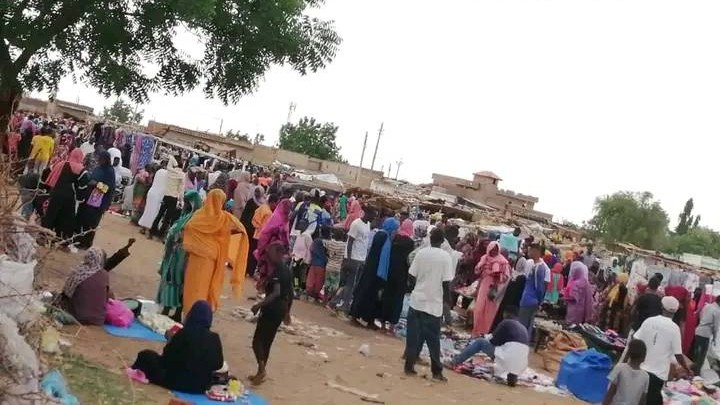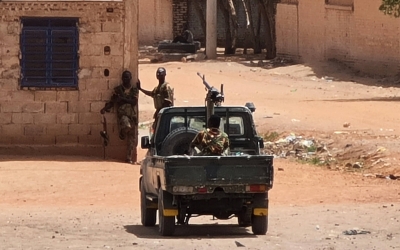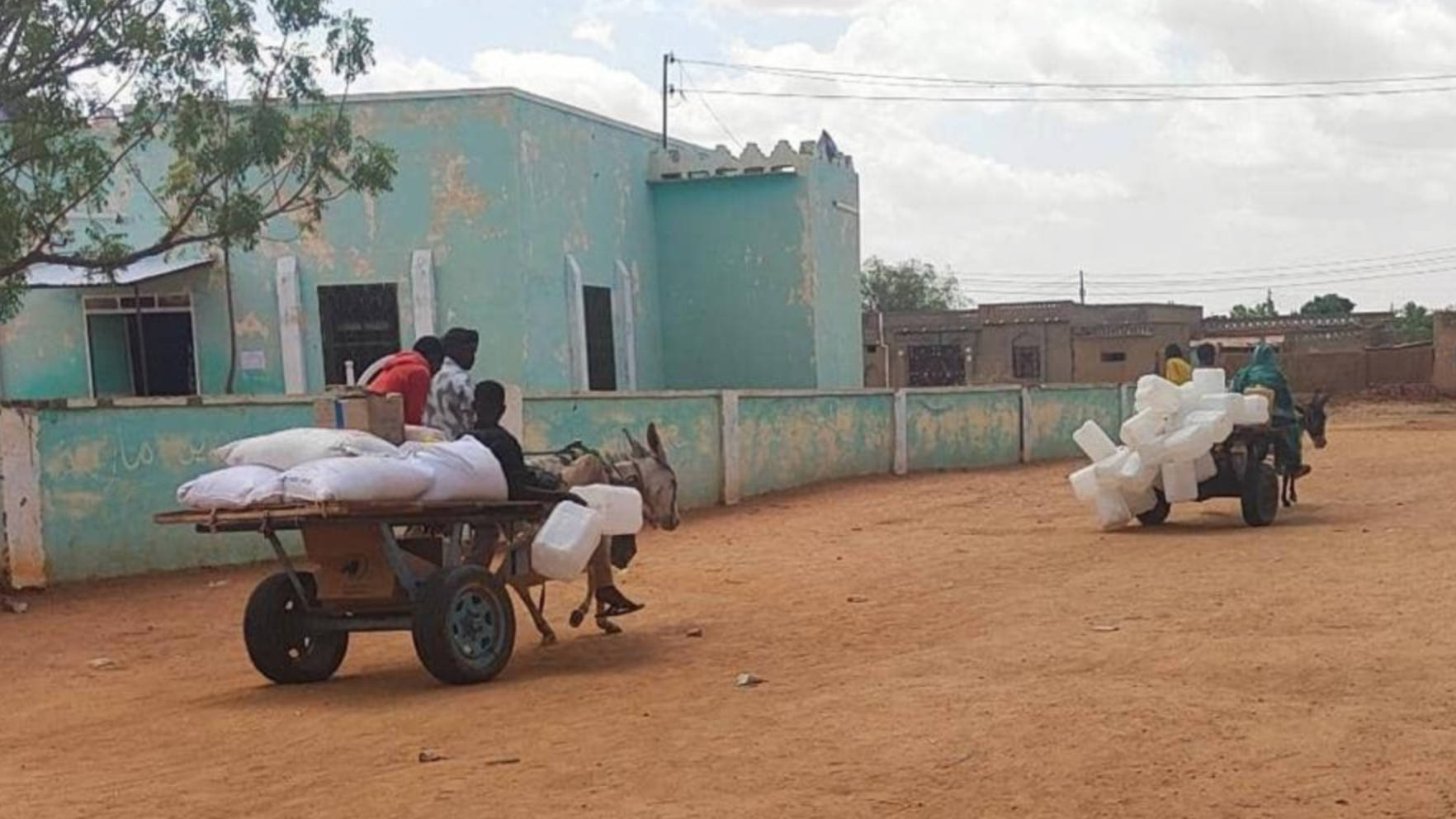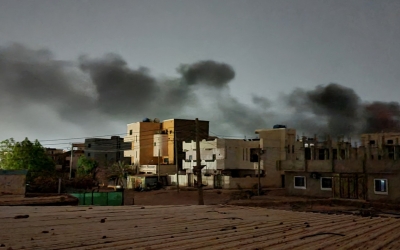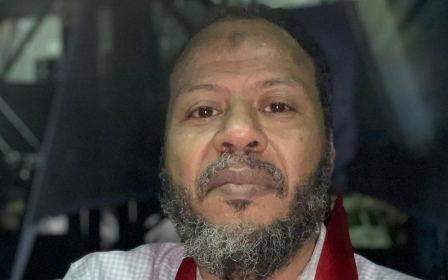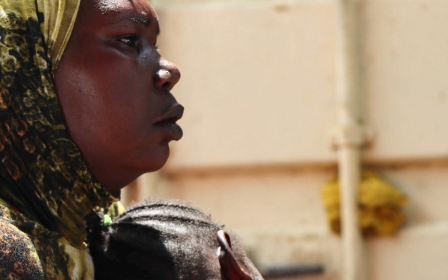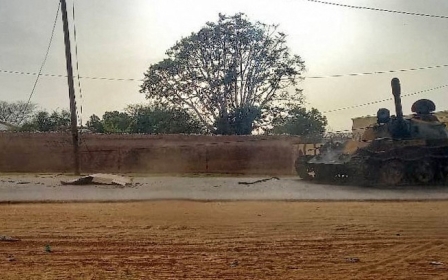Looted goods for sale in Sudan's 'Dagalo' markets
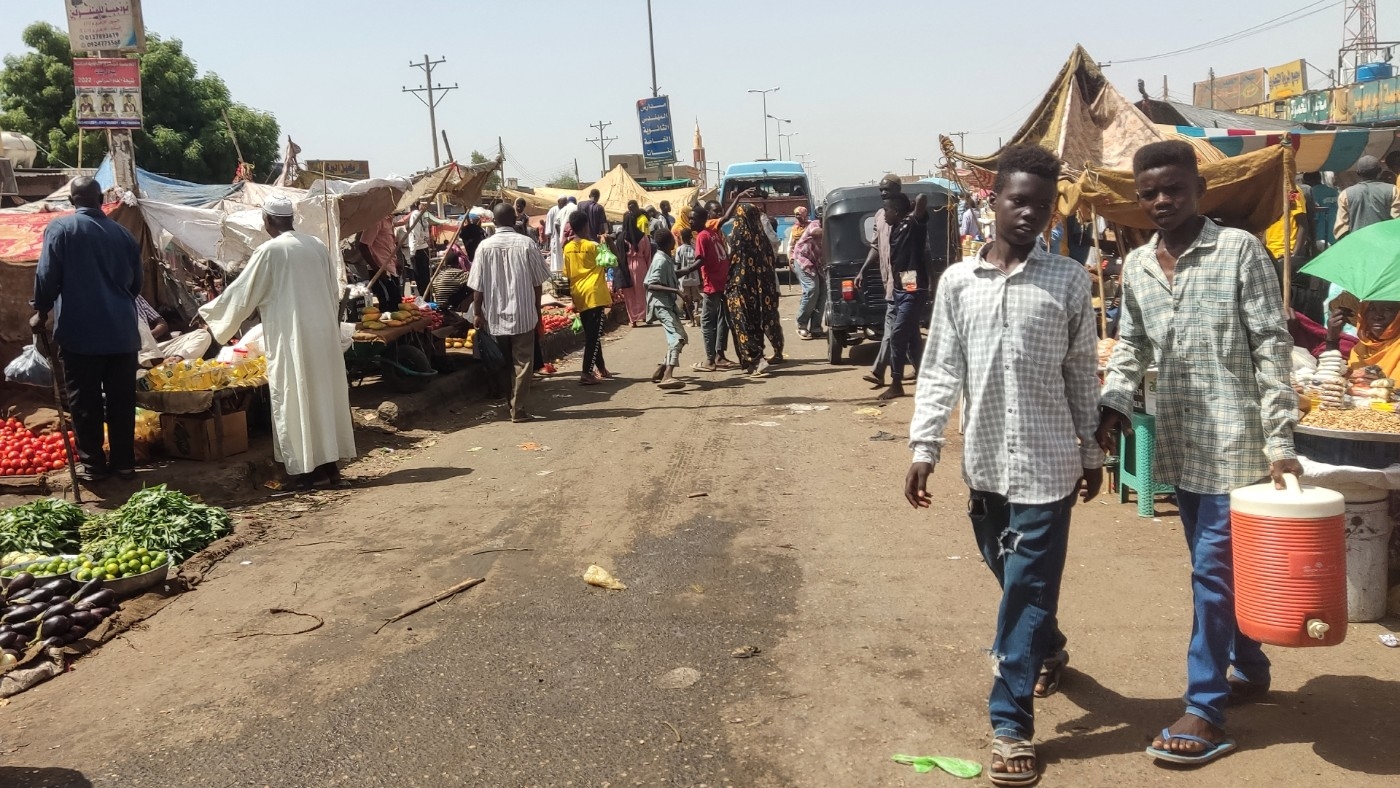
"If you want to buy something cheap in Sudan," a trader in Omdurman told Middle East Eye, "you just come to the Dagalo markets. Whatever it is."
In a country that has been at war since 15 April, sourcing basic provisions is a day-to-day struggle for most. Buying anything else is a bonus. In this environment, a wave of popular markets has sprung up across Sudan, responding to the shortages brought about by war by selling the stolen profits of war.
Goods looted by the paramilitary Rapid Support Forces (RSF), which is locked in conflict with the Sudanese army, are sold at the markets. And these markets are named after the man who leads the RSF: Mohamed Hamdan Dagalo, the general better known as Hemeti.
Smugglers, black market traders, eyewitnesses and victims of looting have told MEE that the Dagalo markets can now be found across the Khartoum metropolitan area, in Kordofan, Darfur and other parts of war-torn Sudan.
Looting has been widespread in Khartoum, which has long been the wealthiest part of Sudan and has, unusually in the country's history, been at the centre of fighting since the war began. Eyewitnesses in the capital and its twin cities Omdurman and Bahri say the looting is being committed by the RSF and criminal gangs.
New MEE newsletter: Jerusalem Dispatch
Sign up to get the latest insights and analysis on Israel-Palestine, alongside Turkey Unpacked and other MEE newsletters
The stolen goods are then taken to Dagalo markets by smugglers, where they are sold by black market traders. The markets are particularly common in the cities of western Sudan, the homeland and power base of the RSF.
MEE has been sent testimony from at least 30 different people in the Khartoum area, who have all fled their homes and then had them ransacked. One wealthy resident of Omdurman told MEE that after they fled their home for Egypt, the RSF broke into the property and looted it.
"They seem to have shot the gates open, broke the grill of the ground floor reception and entered the house," said the mother in her fifties. "They took all our electrical appliances and our car. They threw all the contents of my cupboards on the floor."
Two eyewitnesses in el-Obeid, the capital of North Kordofan, said that it was not just the RSF, criminal gangs and affiliated militias that were benefitting from the looting and the sale of goods at the Dagalo markets. The Sudanese Armed Forces (SAF) had also benefitted, they said.
Moreover, operations of this kind have a long history in the region, as the looted spoils of wars from Libya to Chad to Central African Republic and back to Sudan have all found their way into black markets.
Throughout this ongoing war, the RSF has denied looting the homes of Sudanese civilians. It has previously announced the formation of a "specialised taskforce assigned exclusively for civilian protection" and has promised to return items stolen by gangs.
An official statement issued by the RSF on 13 May finished with the line: "We firmly believe in law and order, and we pledge to strictly handle any reports of crimes, looting or theft."
The paramilitary group has not responded to MEE's request for comment. According to the UN, more than 2.8 million people have been displaced by the war.
Everything you could ever need
At the Dagalo markets, you can find everything from televisions and radios to second-hand cars and tyres, and air conditioning units to beds, pillows and wooden cabinets.
One video shows a trader sitting on a plastic chair offering customers the chance to buy a pair of gold-coloured high-heeled shoes. Another shows a group of men in front of a makeshift stall with updates on the latest price for tarpaulins, mobile phones and oil. A third shows two young men walking through one of the markets, laughing as they repeat the name: "Dagalo".
"Shops have opened in the local markets of Omdurman like Alsoog Alshaabi and Soog Libya," an eyewitness in the area, who preferred to remain anonymous, told MEE over the phone. Others have opened in the Alhaj Youssef and Mayo neighbourhoods in the Khartoum suburbs.
"They have been called the Dagalo markets and are selling everything that has been recently stolen from their owners for very cheap prices. Other properties, especially cars, are sent to the markets in western Sudan, including el-Daein and el-Obeid," the eyewitness said.
'The RSF's commercial arms sit at the peak of this economy of destruction through their banking and trading operations'
- Magdi el-Gizouli, Rift Valley Institute
The Omdurman resident added that in Alsoog Alshaabi, they had seen "traders buying hundreds of electrical devices from small traders or brokers, and reselling them. It's a good business".
"An air conditioner might cost maximum 10,000 Sudanese pounds ($15), and you sell it for 15-20,000 ($33), while its real price is above 70,000 ($120)."
Another source in the Sudanese capital said that RSF soldiers were repainting cars, throwing away the number plates and then either reselling them or smuggling them to markets outside Khartoum.
"There were more than 30 cars parked in view of my store when the war began," the shop owner told MEE. "They were stolen when the RSF took control of this part of east Khartoum."
"Later, I was in contact with some brokers and RSF officers about having the cars returned, but I failed to get them back because the cars had been sent to el-Obeid and el-Daein in East Darfur."
UN warehouse heist
El-Obeid has been besieged by the RSF for over 50 days and is seen by both sides in the war as being strategically vital.
At the beginning of June, warehouses belonging to the UN World Food Programme (WFP) were looted.
Locals blamed the RSF, though the WFP stopped short of pointing the finger at any specific actor. It said that food assistance for 4.4 million people had been put at risk and that it had recorded losses estimated at more than $60m since the war in Sudan began.
A sociologist who fled Khartoum for el-Obeid told MEE that after the looting of the warehouses, there was a two-week period when citizens carried the goods over to a market called Lazha.
"The ironic thing is they changed the name of the market to Dagalo, after the leader of the RSF," he said.
The market is in Taiba neighbourhood, on the east side of the city, the nearest to the warehouses from where the stolen goods it sells came from. It is run by civilians.
"They named it Dagalo because the RSF are the ones who broke into the warehouses and because it contains looted goods," the sociologist, who did not wish to be named, told MEE.
But he added that Hemeti's paramilitary forces were not the only side to benefit from the WFP raid. "When the citizens looted the warehouses, the SAF put up some checkpoints in the streets to stop them and divide up the looted goods with them."
Speaking about how the markets function, a lawyer in el-Obeid told MEE that there are merchants who deal with the RSF, and that they "convert goods into money". The lawyer said the paramilitary group did not have a stable supply of food or a place to store it, so it was relying on "looting produce or just buying it with cash".
Markets in the city have also been the site of violence between the RSF and locals. According to the lawyer, last Sunday, the paramilitary group attacked a series of smaller markets, looting goods and abusing shop owners in the process.
On 10 July, angry at ongoing looting, civilians in el-Obeid beat two men accused of spying for the RSF to death.
The brokers
Many Sudanese who have had their belongings stolen are resorting to dealing with brokers or middlemen to try to get their property back.
Victims of looting told MEE that they have had to deal with the RSF, army and even the police in order to secure the return of important documents like passports, as well as stolen cars. But this all comes at a high price.
One university teacher said she paid an RSF officer $1,000 to find and return her passport, which had been left in an area afflicted by fighting.
"I left my passport in my university office and a friend sent me the contact number for an RSF officer," the teacher said. "I contacted him and he asked me to pay him $1,000 to bring my passport. I accepted. I didn't meet him... he asked for just 24 hours to get it."
Less than a day later, the officer called her from inside the university and asked where her office was. "While I was on the phone, he entered the office and took it. He sent someone else to my home to give it to me and take the money," the university teacher said.
At the beginning of May, Musa Abdul Wahab dealt with similar brokers after his car was stolen from outside his house in southern Khartoum.
"After I fled my house in Khartoum, I heard from my neighbours that RSF soldiers had broken in and taken my car. After contacting many sources in the police and the RSF, I reached someone who could bring it back. I talked to him and he asked for $5,000. He brought it back after I paid the money," he told MEE.
Efforts are also being made to secure the return of looted goods without paying such steep prices.
A number of activists, lawyers and victims have launched an initiative under the slogan "Get out of our homes... We are returning." They have registered nearly a thousand victims of lootings and are looking to launch legal cases against people they describe as "the invaders of Khartoum", meaning the RSF.
Another civilian, Abdul Rahman Abdallah Adam, is returning stolen cars to their owners. He told MEE he had managed this in "dozens of cases" and that he did not take payment for the trouble. He said that he used social media to help find the cars, which are often left abandoned in the streets.
Resistance committees, the organised activists fighting for democracy in Sudan, are working on returning stolen property, including cars, as part of the "emergency rooms" they run across different neighbourhoods.
Committee members in the Khartoum area said they had arrested gang leaders and found stashes of stolen property, which they had then been able to return.
Capitalism in the peripheries
For many in Sudan, the markets are just the latest version of a phenomena that is decades-old and was observed during the war in Darfur in the first decade of the century.
Magdi el-Gizouli, a fellow at the Rift Valley Institute, told MEE that the markets were a sign that the productive economy was being replaced by a "destructive economy focused on loot".
"Elements of this particular economy have been at work for some time, its initial signal being the collapse of Sudan's oil economy in the aftermath of the independence of South Sudan in 2011," el-Gizouli said.
"This was followed by the highly profitable market in contraband cars through Sudan's western borders, famously known as 'Boko Haram' cars. In a way, this market was a means of whitewashing capital earned in the loot economy of the Sahel region and funnelling it into Sudan," he said.
The removal of autocrat Omar al-Bashir in 2019 did not change things, the analyst said, as the transitional government was forced by the International Monetary Fund and World Bank directives to bring in strict austerity measures.
"The RSF's commercial arms sit at the peak of this economy of destruction through their banking and trading operations, and have through militarisation of rural life scooped immense wealth from high-value commodities, primarily gold, cars, narcotics, firearms and debts," el-Gizouli said.
"Armed robbery in Khartoum is in a way an extension of this destructive loot economy into the urban realm following on the heels of a massive expansion in the narcotics trade and the toxic debt market," he said, referencing comparable situations with the narcotics trade in Afghanistan and the captagon business in Iraq.
"I wonder whether there can be any substantial and reasonable international response to this phenomenon, which is arguably the way capitalism now works in the peripheries of the world system."
Middle East Eye delivers independent and unrivalled coverage and analysis of the Middle East, North Africa and beyond. To learn more about republishing this content and the associated fees, please fill out this form. More about MEE can be found here.


